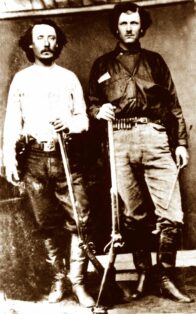Enter now to win a copy of
Tilghman: The Legendary Lawman and the Woman Who Inspired Him

In mid-October 1885, two men ambled down the Jones and Plummer Trail, 120 miles from the Kansas border, toward the Cimarron River. Marshal Bill Tilghman was in the lead, his eyes fixed on the spot the riders would have to ford the swollen waterway. He had a tight grip on a bald-faced mare trailing behind him. Atop the animal was a horse thief named George Synder. He was a dark-complected man in his mid-thirties with a thin moustache and a gaunt intensity that wasn’t entirely healthy looking. Tilghman had journeyed to Mobeetie, Texas, to arrest Synder for stealing a horse that belonged to a politician from Great Bend named J. C. Briggs.
It wasn’t the first time Tilghman had made a long trip to apprehend a criminal. Unlike other lawmen who had to encroach on another jurisdiction to make an arrest, Tilghman insisted on acquiring the necessary writs from the officers overseeing the area he planned to invade. He expected the same courtesy to be shown him from law enforcement seeking to detain an offender in his domain.
In the first pages penned about his life and work, Zoe made note of such professional courtesies practiced by the marshal. “My husband’s career in law enforcement began in Dodge City when the country west of the Mississippi was finding its way,” she wrote. “Bill traveled to Okla homa in 1889 just before the first land rush in the nation. He served the rough Territory for thirty-five years as U. S. deputy marshal, sheriff, chief of police, and special aide to governors. His peers admired his ethics and outlaws feared his tenacity. In the end, when a new kind of frontier opened during the brawling oil boom of the 1920s, Bill gave his life as he had lived it—in the cause of decency and order.” Zoe could envision her husband escorting Synder to jail and contemplating his early years on the open range. His family had moved to Kansas after the military closed the fort where William Matthew Tilghman Sr. had been employed as a sutler at Fort Dodge, Iowa, selling provisions to the troops.
“He grew up on the plains, and a gun was rarely far from his hand,” Zoe noted about Tilghman’s upbringing. “At that time, in 1862, his father and oldest brother Richard enlisted in the Union Army and fought in the Civil War. Tilghman had to do the work on the farm near Atchison, Kansas, and furnish his mother Amanda and six others with food, which mostly consisted of rabbits and prairie chickens. When he wasn’t feeding the stock, milking, and gathering corn, he was practicing his shooting. In time, he was able to provide his mother, brothers, and sisters with geese and turkeys for their meals.”

Tilghman
I'm looking forward to hearing from you! Please fill out this form and I will get in touch with you if you are the winner.
Join my email news list to enter the giveaway.
"*" indicates required fields
To learn more about Marshal Tilghman and his wife Zoe read
Tilghman: The Legendary Lawman and the Women Who Inspired Him

